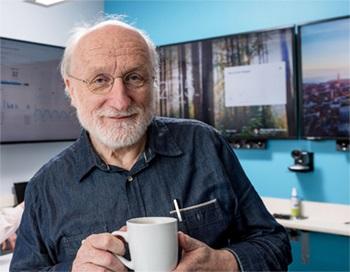Dana-Farber researcher to lead team using machine learning to identify high-risk pancreatic cancer populations
Pancreatic Cancer Collective awarding grant funds
The Pancreatic Cancer Collective, a strategic partnership of Lustgarten Foundation and Stand Up to Cancer (SU2C), today announced grants for computational approaches to identifying high-risk pancreatic cancer populations. One of the teams is being led by Chris Sander, PhD, director of the cBio Center in the Department of Data Science at Dana-Farber Cancer Institute.
The funds for the multi-institutional team will be used to identify individuals who are at high risk for developing pancreatic cancer through machine learning analysis of clinical records, physicians’ notes, and radiological images. The team will be co-led by Regina Barzilay, PhD, Massachusetts Institute of Technology. The other team members are Brian Wolpin, MD, MPH (Dana-Farber Cancer Institute), Michael Rosenthal, MD, PhD (Dana-Farber Cancer Institute), Peter Kraft (Harvard T. H. Chan School of Public Health), and Søren Brunak (University of Copenhagen).
The goal of this team’s project is to develop risk assessment models by using machine learning analysis of clinical records and images to identify high‐risk individuals for pancreatic cancer in the general population. These risk models will lead to a practical tool that can identify patients who are at elevated risk for pancreatic cancer and should be enrolled in screening programs for disease prevention and early detection. This team builds on recent advances in machine learning technology and the availability of rich clinical records from large, diverse patient populations within three health systems: Henry Ford Health System, Partners HealthCare, and the Danish National Patient Registry.
“I am very excited to get started on this project,” says Sander. “Our team will combine expertise in machine learning and pancreatic cancer to devise new strategies for catching pancreatic cancer in its earliest stages, giving patients the best chance at fighting this devastating disease.”
“From diagnosing pancreatic cancer to determining which treatment approach may be best for each patient, we believe the field of AI holds great promise for patients and their families,” stated David A. Tuveson, MD, PhD, Lustgarten’s chief scientist, director of the Cancer Center at Cold Spring Harbor Laboratory, member of the SU2C Scientific Advisory Committee and co-scientific leader of the Collective.
The Pancreatic Cancer Collective announced funding for two teams that will each pursue a different approach to identifying individuals in the general population who are at high risk for pancreatic cancer. More information on the SU2C grants.
Media Contacts
If you are a journalist and have a question about this story, please call 617-632-4090 and ask to speak to a member of the media team, or email media@dfci.harvard.edu.
The Media Team cannot respond to patient inquiries. For more information, please see Contact Us.
